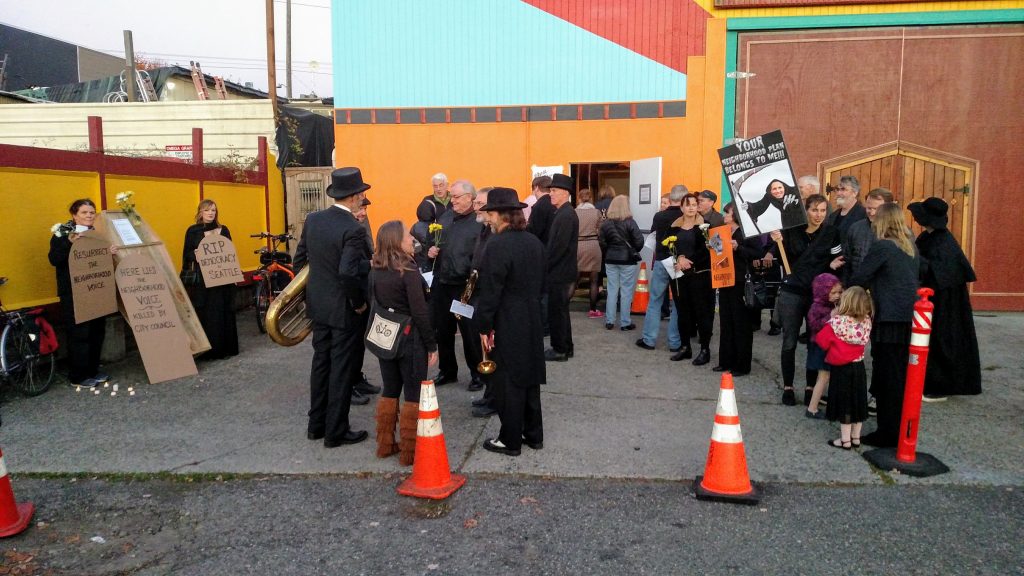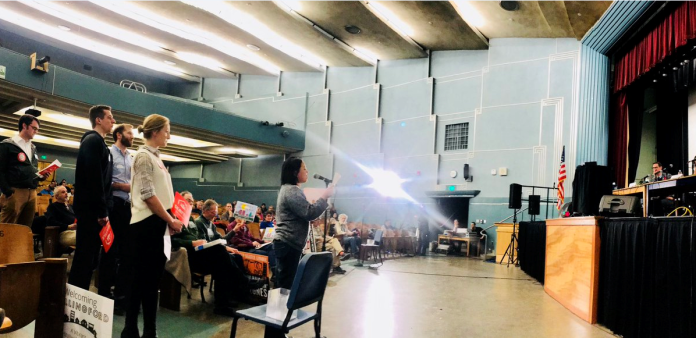In February, you’ve got two big opportunities to make Seattle more affordable.
If you’ve been thinking about getting into local politics but don’t really know where to begin, there are two public hearings in February that are great opportunities to make your voice heard. The two hearings are:
- The Fort Lawton Public Hearing at Catharine Blaine K-8 on Monday, February 11th at 5:30pm
- The Mandatory Housing Affordability (MHA) public hearing at Seattle City Hall on Thursday, February 21st at 5:30pm
Public hearings are intimidating spaces about complicated issues. Here’s what you need to know to get started.
Why should you care?
Seattle’s affordability crisis is the biggest issue our city faces today. Seattle rents have increased by 60% since 2010, leaving more than half of Seattle renters officially rent-burdened. Many communities have been ravaged by displacement, demonstrated by the decline of Central District’s black population from 70% in the 1960s to less than 20% today. More than 8,000 of our neighbors now live unsheltered.
How did we get here?
Three structural problems are at the root of our housing affordability crisis:
- We don’t raise enough revenue to build affordable housing. Sales taxes are regressive, income taxes are illegal in Washington, and business taxes face well-funded opposition from the business community.
- Building more housing is illegal in most of Seattle. Single-family zoning, birthed as a way to perpetuate segregation in redlined neighborhoods, have made everything but McMansions illegal to build in 70% of Seattle’s residential land.
- Building takes a long time and opponents can force delays. While housing demand can move lightning quick, supply takes longer to catch up, which is exacerbated by the Seattle Process and in some cases state law. The State Environmental Protection Act (SEPA) makes it easy to sue the City over affordable housing developments (like Fort Lawton) and legislation (like MHA and backyard cottage reform) that would make Seattle more affordable. You can even use SEPA to demand more parking. Go figure!

How do we fix it?
We need to raise more revenue for affordable housing and allow more types of housing in more places in Seattle. However, it will take political will to do so and the Seattle City Council faces stiff opposition to changes, mostly from neighborhood groups that want to perpetuate the status quo. These groups are typically older, whiter, and more likely to own their home than the typical Seattle resident.
We need your voice!
What’s Fort Lawton?
Seattle is proposing to build up to 240 units of affordable housing at a decommissioned military base called Fort Lawton in Magnolia. However, the proposed development has been tied up in lawsuits from homeowner groups since 2008. It’s taking so long that the government is threatening to take the land back due it not being re-purposes as promised. You can read more about the debate around Fort Lawton housing here.
What’s MHA?
Mandatory Housing Affordability (MHA) is a policy being considered by the Seattle City Council that would allow more development in certain areas of the city in exchange for new development contributing to affordable housing. Instead of the exclusionary zoning of the past, Seattle turn to inclusionary zoning is intended to promote mixed-income neighborhoods. You can read more about MHA here.
What do you do at a public hearing?
You should arrive 30 minutes before the hearing starts to sign up for comment. Whoever is running the meeting will call names up to the microphone in order. Each commenter, in the order they signed up, speaks for 2 minutes. You can usually also sign up as a group (minimum of 4 people) to get a total of 5 minutes of speaking time.
What should you say?
A good formula for public comment is to introduce yourself, talk about why you care about the issue at hand, and to recommend the City to do something. You don’t have to have deep knowledge of the subject matter or agree with the direction the City is going; it’s more important to let the City know where you stand in principle.
Here are some themes you could riff on:
- Affordability. It’s too expensive to live in this city.
- Racial equity. Housing affordability disproportionately impacts communities of color.
- Inclusivity. My neighborhood is better when more people from diverse backgrounds live here.
- Economic diversity. I want Seattle to be affordable to teachers, nurses, baristas, and other working class people.
- Environmentalism. People should be able to live close to wear they work so they can have a low-carbon commute.
In general, try to keep it personal (“my friend, who’s a teacher, can’t afford to live here anymore”), non-technical (“I support more types of housing in more places”), and positive (“we should fund more affordable housing so all of our neighbors can afford to live here”). Watching a previous public hearing is a good way to get an idea of what to say.
How can I get more involved?
Here are some advocacy groups you can check out:
- Transit Riders Union
- Seattle Democratic Socialists of America
- Share the Cities
- Tech 4 Housing
- 350 Seattle
- Sierra Club Washington
- Capitol Hill Renter Initiative
This is a small sample of what’s out there and is biased by my experience. The best way to get engaged is to show up to meetings and see what you like!

Calvin Jones
Calvin Jones is a member of the Seattle Renters’ Commission and an organizer for Tech 4 Housing. He's a renter in Madison Valley.

